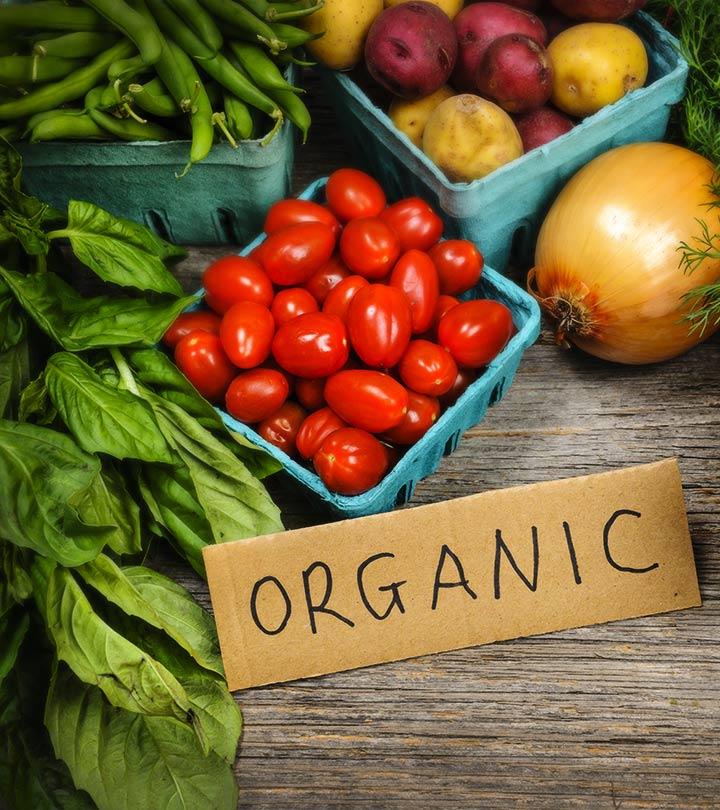
Organic food is healthier, isn’t it? At least, that’s what is widely believed. But what is the real deal? Are there any pros and cons to organic food? Yes, organic food is devoid of chemicals that are potentially harmful to health. However, a higher price point can make it inaccessible to all. Let’s take a deeper dive and learn about organic food, its benefits, and its disadvantages. Continue reading.
What is Organic Food?
Here we present the pros and cons of organic foods to simplify your decision to go for it or refrain from it:
Let’s have a look at the various pros of eating organic food:
1. No Chemicals
Unlike conventional farming, organic farmers are restrained from using synthetic fertilizers, chemical additives, or preservatives in their produces. As such, the food you eat has no chemical residues to harm your body. And you are also safe from poisonous pesticides posing serious health issues (3).
2. Eco-Friendliness
Organic farming is a boon to our deteriorating environment. As it does not go by the principle of increasing crop size, it has lesser complications for the soil and atmosphere. They also conserve water for our future. In organic farms, there is increased diversity of crops .
3. High Nutritional Values
As compared to conventional farming, organic products are rich store houses of minerals. Organic farming increases the potency and benefits of soil. As such, these benefits are passed on to you whenever you eat these products (3).
4. Better Taste
Organic farming induces better taste in your food (5). Taste in food develops with the amount of its sugar content. With better nutritional inputs, organic farms increase this taste considerably. You can enjoy naturally sweet apples and berries.
5. Zero Hydrogenated Fat
Eat organic and forget about heart disease! Yes, organic produce is devoid of any hydrogenated fat. This, in turn, reduces your risk of heart-related ailments. It also readies you to take on the challenges of hectic life schedules easily – thanks to its high antioxidant content .
6. Organic Is Healthy For Unborn As Well
Research has proved that pesticides and harmful fertilizers of non-organic food may traverse the placentai to harm unborn babies. The toxins in such food can cause serious health issues for them. In fact, lower birth weight, autismi , and birth defects in some cases are attributed to these chemicals. So, with organic food, your unborn baby is protected from such disorders (6). And we have a healthier generation ready!
Cons Of Organic Food:
Let’s have a look at the various cons of organic food:
7. High Price Levels
In organic farming, the produce is usually lower due to the lack of synthetic fertilizers. As such, they tend to be more pricey than non-organic food. Even the overhead costs are higher in organic farming. All these factors make them heavier for your pocket (7).
8. Spoils Quickly
This is the most alarming fact related to organic food. It goes off the shelves rather quickly. Actually, organic food is produced without artificial preservatives or irradiation. Hence, they tend to be spoiled faster than processed non-organic food (8).
9. Contamination By E. Coli
This bacteria found in the intestinal tract of animals is a threat to human health. It has been revealed that even organic food is not safe from the contamination caused by it. Some alarming revelations have been made in recent studies that organic food is not actually better than conventional food on the counts of health benefits and nutrition (8).
10. Hard to Find
Sometimes, you may not be able to find organic food at a store near you. This is basically due to the non-feasibility of organic farming in every region. Also, because organic food has a lower shelf life, you cannot always expect to procure it from far-flung areas where organic farming is done.
With these pros and cons of organic foods, whether you should choose organic food or not, depends on your personal choice anyways!
The demand for organic food is increasing nowadays as people have become more health-conscious. But there are pros and cons of organic food that one should be aware of before consuming organic food. It is true that organic food is free of chemicals, eco-friendly, has high nutritional value, tastes better, is devoid of hydrogenated fat, and is beneficial for pregnant women. However, it spoils quickly, is more prone to E.coli infection, and has high pricing levels when compared to the other food range. In addition, it is also difficult to find organic food everywhere. We hope the article will help you make a conscious decision.



 Users Today : 19
Users Today : 19 Total views : 665902
Total views : 665902